

The short but incisive texts of José Correia da Serra, who was engaged in his role as secretary of the ACL at the time, allow for a comprehensive interpretation of the overall meaning of the history the ACL wished to practice. The first point at which he expresses his views on the relevance of history emerges in the foreword to volume I of the collection of Memórias Económicas [Economic Memoirs](1789), when he explains that a knowledge of the resources and productive potential of the kingdom and its dominions, with a view to improving their use, not only requires in-depth knowledge of the natural and exact sciences, which may contribute to this end, but also of the history which provides clues to why certain objectives are achieved while others are not. In his own words, there is no doubt about the mission that falls to historians: "It is up to those who delve into former successful achievements to conduct this analysis and to disseminate what has already brought us gains and losses, and the causes of why we have grown or declined in number, in strength, in light, in riches. The knowledge of what the nation is and of what it may be on the basis of what it has already been is the most conducive to its happiness, and can only be expected from the united efforts of such a body as the Academy" (José Correia da Serra, Foreword, Memórias Económicas, Part I, 1789, p. 10).
This view on the relevance of history in order to understand the present and to establish the most suitable procedures for political action so as to pursue specific objectives is resumed again in another foreword that opens the Colecção de Livros Inéditos de História Portuguesa in 1790. The evolutionary chain of circumstances and events bestows an irreplaceable position upon history in the knowledge of society. Therefore, as far as Correia da Serra is concerned, "The History of Portugal is not an indifferent study for us, or one based on mere curiosity (...) The laws that govern us, the classes of people into which the nation is divided, the forums, privileges and obligations of each one of us, the nature of the goods we possess, the forms of public administration, the customs we follow, the language we speak, are all consequences of past achievements, and in them we can only find the knowledge of their origin, and the explanation for their nature. If glory did not move us to study them, then pure need would". (José Correia da Serra, Foreword, Colecção de Livros Inéditos de História Portuguesa, Part I, 1790, p. vii).
